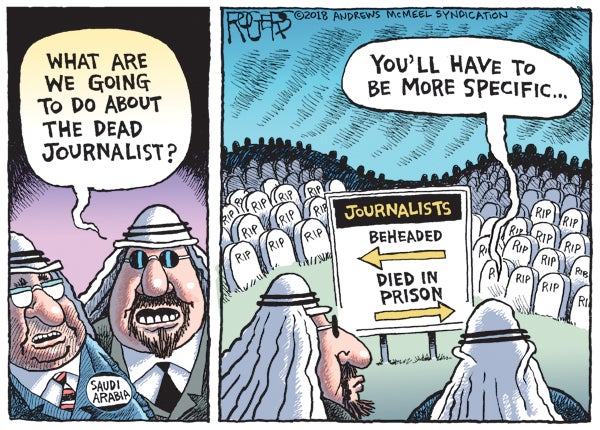Georgie Anne Geyer: ‘Modernization’ comes to Saudi Arabia
Published 3:18 pm Tuesday, October 16, 2018
WASHINGTON — On my first visit to the then-closed and mysterious desert kingdom of Saudi Arabia in 1974, I soon came up against the confused psyche of many modern Saudis, and I recognized the tormenting question of modernization in societies with few tools to handle it.
“How would you like to interview the first Saudi Bedouin boy to get his doctorate in the United States?” a government official asked me. Of course!
But when I met the handsome young Faisal Bashir in his government office and noted how very proud his parents must be of him, he burst into tears.
“Proud?” he said fiercely, seeming almost to jeer at himself. “I’m not proud! I’m very ashamed. My mother needs me. They are with the herds somewhere up in Iraq now. I should be with her. Instead, I am here.”
I’ve thought a lot about Faisal these last few days, ever since the Saudi journalist Jamal Khashoggi walked into the Saudi consulate in Istanbul on Oct. 2 and “mysteriously” disappeared. It takes the credulity of a court fool in ancient times to not believe the “reformist” Crown Prince Mohammed bin Salman, a man you dare not criticize, sent a 15-man hit team that killed Khashoggi, dismembered his body and left the country in two private Saudi planes.
Unless a miracle happens, we are witnessing a veil being rent — not only revealing some unbelievably ugly truths about MBS, as the crown prince is called, but also about his credulous “friend” in Washington, the American president. The two men have courted in Riyadh and Washington — President Trump sword-dancing during his visit to the kingdom and MBS being feted in the White House are the stuff of history now.
Yet there is a recklessness, dark on the Saudi side and bordering on dangerously simplistic on the American side.
First, look at the vast desert that is Saudi Arabia. My Ph.D. friend Faisal’s country was quite different then than it is today. The 3,000 (give or take a few) princes often threw their money around on the Riviera, but the kings of the House of Saud were austere men. The old Saudi kings had drawn, sober faces, like ones carved in sand. They bought people off in the timeworn practice of the tribes and generally ruled by consensus.
But the world, particularly forces in the United States, kept telling them to reform, to modernize, to become part of the civilized world. It became embarrassing for them to seem so backward.
Enter, four years ago, the brash and swaggering young prince, MBS, who launched midnight coups, arresting hundreds of wealthy Saudis and holding them (how very Saudi) in the Ritz-Carlton until they paid $100 billion for his grand projects. And most Western power centers applauded.
Saudi intelligence took a dark turn. In comments in The New York Times last March, Khashoggi spoke about how the crown prince’s men had learned too well to master social media and technology to command “a troll army” online and show MBS’s Arabia in flattering terms even as it was involved in nasty fights against Iran and Qatar and in an American-supported war in Yemen. It was a long way from the desert tents, but not exactly a good development.
Perhaps the bonding of MBS and Donald J. Trump was inevitable. Both like to think of themselves as strongmen or warriors. Both talk investments all the time, both abhor criticism and, in the end, what both actually want is power.
Which brings us to some final questions:
• Could President Trump’s hatred of the press and his “enemies of the people” speeches have encouraged MBS? Of course! As Robert Kagan of the Brookings Institution wrote last week in The Washington Post: “Saudi Arabia is a small nation that cannot defend itself without the support of the United States, and therefore, no Saudi leader would have made such a brazen move without confidence that Washington … would do nothing.”
Also, monarchical “reformers” are not generally what they seem to be. Former director of the CIA John Brennan commented recently in the Post that “authoritarian leaders like Mohammed become increasingly paranoid over time and use the instruments of national power to eliminate real and perceived sources of opposition.”
• If this is proven to be state-sponsored murder by President Trump’s “friend,” can he afford not to act strongly? If he does not, he will look foolish indeed for his naivete, as it appears that, with the Saudis, this emperor has no robes.
• Finally, is there a deeper American responsibility here? I have grown more critical of our constant pushing of democracy, reform and modernization in societies ill-prepared for such change. We may well be seeing the result of that at work here.
Perhaps the most honest words of this entire awful saga were voiced by MBS himself. In a Bloomberg interview earlier this month, shortly after Khashoggi’s disappearance, he said of all the fuss over him, “I didn’t call myself a reformer.”
Georgie Anne Geyer has been a foreign correspondent and commentator on international affairs for more than 40 years. She can be reached at gigi_geyer@juno.com.


